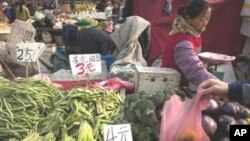Some angry Chinese consumers are blaming the United States' monetary policies for inflation in China. The finger pointing follows the Chinese government's decision to impose price controls on food, introduce subsidies for the needy and increase fuel supplies.
Supermarket shoppers in Beijing shake their heads in disapproval as store keepers make corrections to the price of their goods.
All over China, inflation is raising prices on hundreds of items - from garlic to porcelain to Big Macs and fuel.
Last month's 4.4 percent rise in the consumer price index is most acutely felt by shoppers like Mrs. Yu.
She says the cost of her filling her shopping basket is more expensive by the day and this is affecting the quality of her life.
Echoing a criticism made by the Chinese government, she blames the United States because of its monetary policies.
Beijing says the U.S. move to pump $600 billion into the American economy will send a flood of cash into emerging economies such as China and fuel inflation.
Economist Tim Condon at insurance company AIG says Mrs. Yu and her government are only half right in blaming the U.S. for inflation.
He says food price inflation tends to be a supply phenomenon and that costs will soon stabilize.
"There always seems to be problem with supply due to poor rain, or too much rain, or sun spots or whatever. But those shocks are transitory and those supplies come back and prices come down," said Condon. "I don't think Chinese consumers are going to be seeing steady one yuan [15 cents] hikes in the price of a Big Mac. I think it is going to be a one off adjustment and prices will be steady again."
China suffered severe summer flooding this year, and early winter cold snaps have also hit crops.
But the government remains worried about rising prices, which are politically sensitive in a country where a large portion of family income goes to food.
To control costs, the country's cabinet announced late Wednesday it is imposing price controls on key foods, offering food subsidies for the poor and increasing fuel supplies.
The government hopes that intervention will keep consumer prices from rising too quickly.
Grain, oil, sugar and cotton are markets the government wants to stabilize.
Officials say they will further crackdown on price speculation and punish those found hoarding commodities and pushing up prices illegally.
But many economists think the government faces a quandary. If it fights inflation too aggressively, it could hurt efforts to raise rural incomes and to shift the economy more toward domestic consumption, and away from its dependence on exports.
Sharp food price increases encouraged many Chinese to take part in the 1989 Tiananmen Square pro-democracy protests, which ended in bloodshed when the government sent in tanks and soldiers.
Chinese Blame US as Food Inflation Bites




